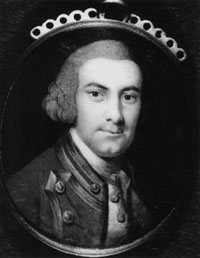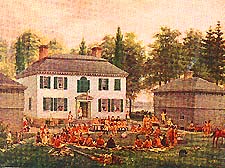 |
British Leader
![]()
William Johnson arrived in the Mohawk Valley in 1738 at the age of 23. He was in America at the invitation of his uncle Peter Warren who had married into a prominent family and acquired land and an estate near Fort Hunter. Johnson's uncle brought him to America in order to recruit colonists who would purchase and subsequently settle the lands that he had acquired. In 1739, Johnson bought some additional land west of Albany, New York. There he built himself a store and home. The store was stocked with trade goods with the intention of trading for furs with the Iroquois. He did this very successfully for many years.
William Johnson
called his homestead Mt. Johnson  and
it quickly became a place where the Iroquois and Colonial leaders met for
business and political purposes. As an intermediary between the tribal and
the colonial cultures, Johnson quickly became a very influential man and one
of the wealthiest individuals in New York.
and
it quickly became a place where the Iroquois and Colonial leaders met for
business and political purposes. As an intermediary between the tribal and
the colonial cultures, Johnson quickly became a very influential man and one
of the wealthiest individuals in New York.
In 1746, the governor, George Clinton, made Johnson New York's exclusive Indian agent. This was an important position that helped him vastly increase his mercantile business. In time, Johnson became the chief supplier of the Iroquois, Colonists, and the military in the Mohawk Valley; being the Indian Agent was a significant economic advantage to Johnson.
At the Albany Congress, Johnson does not appear in the official record until July 11, the last day of the gathering. Speaking to the Colonial commissioners,
|
"Johnson proposed building forts among the Iroquois and garrisoning them with soldiers, smiths, schoolmasters, missionaries, and military officers who could act as commissioners for the fur trade. He stated that prices for Indian goods should be fixed and subsidized, to eliminate fraud and cement the Indian's dependence on the British." (This quote is taken from Timothy Shannon's book, Indians and Colonists at the Crossroads of Empire) |
The sentiments expressed in Johnson's speech helped increase his influence and made him an important figure in Colonial politics. He came to Albany as a local merchant with influence among the Iroquois and he left as a Colonial expert on the Covenant Chain. In 1755, this would lead to his being named New York's permanent agent for Indian Affairs.
William Johnson's reputation as an effective liaison between the Native population and Europeans was known throughout the British Empire as is demonstrated by this testimonial, which appeared in a contemporary publication - the London Gentleman's Magazine, for September, 1755
| "Major General Johnson (an Irish gentleman,) is universally esteemed in our parts, for the part he sustains. Besides his skill and experience as an officer, he is particularly happy in making himself beloved by all sorts of people, and can conform to all companies and conversations. He is very much of the fine gentleman in genteel company. But as the inhabitants next to him are mostly Dutch, he sits down with them and smokes his tobacco, drinks flip, and talks of improvements, bear and beaver skins. Being surrounded with Indians, he speaks several of their languages well, and has always some of them with him. His house is a safe and hospitable retreat for them from the enemy. He takes care of their wives and children when they go out on parties, and even wears their dress. In short, by his honest dealings with them in trade, and his courage, which has often been successfully tried with them and his courteous behaviour, he has so endeared himself to them, that they chose him one of their chief sachems or princes, and esteem him as their common father." |
William Johnson's reputation with the Iroquois and with Europeans made him the perfect person to act as a bridge between the two cultures at Albany and in the years to come.
Home Page | Assessment
| Lesson 1 | Lesson
2 | Lesson 3 | Lesson
4 | Frontier
Characters
Learning Aids | Great
Law of Peace | US Constitution | Timeline
| Works Cited
© 1 October 2001, Portland State University